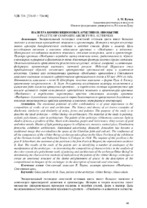Палитра композиционных архетипов. Инобытие
Another Title
A palette of composite archetypes. Alterness
Bibliographic entry
Бучка, А. М. Палитра композиционных архетипов. Инобытие = A palette of composite archetypes. Alterness / А. М. Бучка // Архитектура во времени и пространстве-2023 [Электронный ресурс] : материалы Международной научно-практической конференции, 28 апреля 2023 г. / сост. М. И. Китаев ; редкол.: Е. Е. Нитиевская (отв. ред.) [и др.]. – Минск : БНТУ, 2023. – С. 40-44.
Abstract
Эмоциональный потенциал сочетаний оттенков цвета имеет большое значение в композиции произведений живописи и архитектуры. История и теория искусства знают примеры диахронического сходства и подобия стилей, форм и палитр. Цель исследования состоит в описании идеального архетипа – «Инобытие» в зодчестве. Материалом исследования является живопись, стилевая полихромия, цвет в архитектуре. Палитра архетипа «Инобытие» передаёт: свет в оттенках неона, градиента синего, чёрного с киноварью, пурпурного и фиолетового тона; блестящую фактуру золота и других металлов. Оттенки светописи проявляются в религиозном искусстве, мозаике, витраже, иллюминации, фейерверке, архитектуре выставок, световой рекламе. Небесный Иерусалим стал традиционным образом, осеняющим пространство христианской веры и культового искусства. Слияние всех составляющих архетипа «Инобытие» происходит в Стеклянном павильоне выставки немецкого художественно-промышленного союза в Кёльне 1914-го года. Вдохновитель павильона – поэт П. Шеербарт, заказчик павильона – фирма Пуль & Вагнер, архитектор экспрессионист – Б. Таут. Результаты исследования палитры заключаются: в выявлении ряда аналогов проявления архетипа; - в определении состава характеристик при анализе цветового строя полихромного произведения живописи и архитектуры архетипа «Инобытие»; в определении характерных приёмов стилизации палитры архетипа «Инобытие» для создания эмоционального строя божественного просветления благодати; в описании композиционных приёмов архетипа; в описании материалов и конструкций.
Abstract in another language
The emotional potential of color combinations is of great importance in the composition of works of art and architecture. The history and theory of art knows examples of diachronic similarity and similarity of styles, forms and palettes. The purpose of the study is to describe the ideal archetype – «Other Being» in architecture. The material of the study is painting, stylistic polychromy, color in architecture. The palette of the archetype «Otherness» conveys: light in shades of neon, a gradient of blue, black with cinnabar, purple and violet tones; shiny texture of gold and other metals. Shades of light painting appear in religious art, mosaics, stained glass, illumination, fireworks, exhibition architecture, illuminated advertising. Heavenly Jerusalem has become a traditional image that overshadows the space of the Christian faith and cult art. The confluence of all the components of the «Other Being» archetype takes place in the Glass Pavilion of the exhibition of the German Artistic and Industrial Union in Cologne in 1914. The inspirer of the pavilion is the poet P. Scheerbart, the customer of the pavilion is the firm Poole & Wagner, the expressionist architect B. Taut. The results of the study of the palette are: in identifying a number of analogues of the manifestation of the archetype; - in determining the composition of characteristics in the analysis of the color system of a polychrome work of painting and architecture of the archetype "Other Being"; in determining the characteristic methods of stylization of the palette of the «Other Being» archetype to create an emotional structure of the divine enlightenment of grace; in the description of the compositional techniques of the archetype; in the description of materials and structures.

